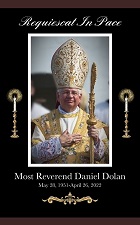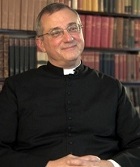Victor III and the Thesis. A Tale by Fr. Desposito
In the YouTube lecture "Victor III and the Thesis" Fr. Nicholas Desposito[*] tries to convince listeners that the election of Pope Victor III is the irrefutable proof of the "Material Pope Thesis".
Below is the full text of the lecture:
"There are two essential elements necessary to produce a pope: the election on the part of the cardinals and the consent to the election on the part of the elect.
It is quite possible for the elect not to accept the papacy.
This happened for instance in 1086. Victor III was elected that year, but he strongly refused to accept the election.
He was forced to stay in Rome and wear the papal robes. He managed to flee deposing his pontifical insignia.
Only one year later he decided to go back to Rome moved by the tears and prayers of the Church.
And at last he accepted the election.
The Church managed to be one whole year without the pope, only with a pope-elect.
The election was never taken from Victor. His right to become the pope remained even after rejecting the election.
Why? Because the cardinals refused to elect anyone else.
This historical case shows that it is possible for the Church to elect someone and that at the same time the natural effect of election be impeded.
In the case of Victor it was his refusal to accept the election.
With the Thesis we say that in the case of the "Vatican II popes" there is intention to impose heresy upon the Church that prevents them from properly accepting the election and thus receiving the papacy.
In both cases we have an election not properly accepted.
If Victor III was able to become the Pope one year after his election without a need of a new election, we affirm that it is also possible for the Vatican II pope to become the pope formally in the moment he truthfully repudiates Vatican II. Only then he would have properly accepted his election."
My comment
Let us first see what is written about the election of Pope Victor III in THE CATHOLIC ENCYCLOPEDIA:
"Desiderius had been appointed papal vicar for Campania, Apulia, Calabria, and the Principality of Beneventum with special powers for the reform of monasteries; so great was his reputation with the Holy See that he "was allowed by the Roman Pontiff to appoint Bishops and Abbots from among his brethren in whatever churches or monasteries he desired of those which had been widowed of their patron" (Chron. Cas., Ill, 34)." p. 410
"When autumn came Desiderius accompanied the Norman army in its march towards Rome, but becoming aware of the plot which was on foot between the cardinals and the Norman princes to force the tiara upon him, he would not enter Rome unless they swore to abandon their design; this they refused to do, and the election was postponed. At about Easter (Chron. Cass., Ill, 66) the bishops and cardinals assembled at Rome summoned Desiderius and the cardinals who were with him at Monte Cassino to come to Rome to treat concerning the election. On 23 May a great meeting was held in the deaconry of St. Lucy, and Desiderius was again importuned to accept the papacy but persisted in his refusal, threatening to return to his monastery in case of violence. Next day, the feast of Pentecost, very early in the morning the same scene was repeated. The consul Cencius now suggested the election of Odo, Cardinal-Bishop of Ostia (afterwards Urban II), but this was rejected by some of the cardinals on the ground that the translation of a bishop was contrary to the canons. The assembly now lost all patience; Desiderius was seized and dragged to the Church of St. Lucy where he was forcibly vested in the red cope and given the name of Victor (24 May, 1086). The Church had been without a head for twelve months all but a day. Four days later pope and cardinals had to flee from Rome before the imperial prefect of the city, and at Terracina, in spite of all protests, Victor laid aside the papal insignia and once more retired to Monte Cassino where he remained nearly a whole year. In the middle of Lent, 1087, a council of cardinals and bishops was held at Capua at which the pope-elect assisted as "Papal vicar of those parts" (letter of Hugh of Lyons) together with the Norman princes, Cencius the Consul, and the Roman nobles; here Victor finally yielded and "by the as-sumption of the cross and purple confirmed the past election" (Chron. Cass., Ill, 68)." p. 411
THE CATHOLIC ENCYCLOPEDIA, AN INTERNATIONAL WORK OF REFERENCE ON THE CONSTITUTION, DOCTRINE, DISCIPLINE, AND HISTORY OF THE CATHOLIC CHURCH EDITED BY CHARLES G. HERBERMANN, Ph.D., LL.D. EDWARD A. PACE, Ph.D., D.D. CONDE B. FALLEN, Ph.D., LL.D. THOMAS J. SHAHAN, D.D. JOHN J. WYNNE, S.J. ASSISTED BY NUMEROUS COLLABORATORS, IN FIFTEEN VOLUMES, VOLUME XIII, New York, ROBERT APPLETON COMPANY, Nihil Ohstat, February 1, 1912, REMY LAFORT, D.D., CENSOR, Imprimatur +JOHN CARDINAL FARLEY ARCHBISHOP OF NEW YORK, p. 410, p. 411
Now, I will explain why the election of Pope Victor III has nothing to do with the "Material Pope Thesis".
According to the teaching of the Catholic Church, a pope-elect is a Catholic man who was elected by the Cardinals[**], but who yet did not accept the election. After he accepts the election he immediately becomes the Pope and receives directly from Christ the fullness of the power of the Vicar of Christ.
There is no such office in the Catholic Church as "pope-elect". A person before the acceptance of the election, does not receive any office and any power. He only has the right either to accept or to reject the election. If he accepts election, he immediately becomes the Pope, the Vicar of Christ, and receives directly from Christ the plentitude of jurisdiction and power over the Catholic Church. If he rejects election, he does not receive any jurisdiction and any power.
There is no office of the "material pope" either. "Material Pope Thesis" is a tale imposed on members of the "Roman Catholic Institute" (RCI) and on seminarians of the Most Holy Trinity Seminary by Bishop Donald Sanborn as "only position that offers a way out of the present crisis" and saves the Apostolicity of the Catholic Church. The priests of the RCI, in turn, impose this non-Catholic tale on the faithful who attend their Masses.
According to this tale, a manifest heretic elected by a group of manifest heretics, turns into a "material pope" and receives "supplying power" directly from Christ to perform the following acts: appointing Bishops to the Apostoloc Sees, creating Cardinals and changing Mode of Election and others "acts which are absolutely necessary for the Church to continue existing and functioning."
Fr. Desposito wrote in his "Catechism":
"Since a defect of intention prevents “Vatican II popes” from receiving ordinary supreme power, the only power “Vatican II popes” are capable of receiving is supplied power, which Christ directly grants to them for those acts which are absolutely necessary for the Church to continue existing and functioning." THE LITTLE CATECHISM ON THE THESIS, Nicolás E. Despósito, p. 5
From this "Catechism" and from all articles and explanations written by the proponents of the "Material Pope Thesis" it is quite clear that the "Thesis" does not explain how the heretical "material pope" is not the Pope, but how the "material pope" IS the Pope.
It seems that the propagators of the "Material Pope Thesis" are trying to paraphrase "The Ugly Duckling" fairy tale. They try to convince readers that the Ugly Duckling actually is a poor Swan, and the only thing required of him in order to be recognized and accepted by the flock of the Swans, is just to realize himself that he had been not a Duckling but a Swan all this time.
The only difference between these two fairy tales is that in the "Material Pope Thesis" the "flock of Swans" not only must recognize the "Ugly Duckling" as a beautiful Swan in order to invite him into the family, but that he already is the actual leader of the flock without any recognition, and that the flock of Swans "lack knowledge of scholastic philosophy and sacred theology" to recognize him as the formal leader of the flock.
Returning to Fr. Desposito's tale about Pope Victor III, let's see what's wrong with it:
1. The process of the election was not completed until Desiderius accepted the election with the name Victor, and that is why no new election was needed.
2. Abbot of Monte Cassino, Desiderius accepted the election a year after he was elected on 24 May, 1086, and that means that process of the election was not completed until Desiderius accepted the election with the name Victor in the middle of Lent of 1087.
3. Desiderius became the Pope a year after he was elected, but during that year he still remained the Abbot of Monte Cassino and the Papal Vicar for certain territories, without having any supplying jurisdiction or power.
4. There is no offices of "pope-elect" and "material pope" in the Catholic Church.
5. According to the "Thesis", every heretical "pope-elect" accepts the election AT THE CONCLAVE without hesitation (unlike Pope Victor III), but "becomes the pope formally in the moment he truthfully repudiates Vatican II," even many years after the closure of the conclave. However, he receives "supplied power" directly from Christ, and after the closure of the conclave (being a public heretic) DE FACTO occupies the Throne of Saint Peter as "material pope" until his death or conversion.
6. Pope Victor III was never a heretic neither before the election nor afterwards, and only a year after he was elected when he obtained fullness of the authority over the Catholic Church in the moment of the acceptance of the election.
Conclusion
The election of Pope Victor III cannot be used to support the "Material Pope Thesis", because it was not a similar case at all. On the contrary, the case of Pope Victor III refutes the "Material Pope Thesis" as a new, false, non-Catholic, heretical teaching.
Fr. V
[*] Fr. Nicholas Desposito is so-called "vice rector" of the "Most Holy Trinity Seminary", and one of the most zealous propagators of Bp. Donald Sanborn's "Material Pope Thesis" which is a modification of Bp. Guerard des Lauriers' "Thesis of Cassiciacum".
[**] "Gregory X (1271-76) finally reserved the right of electing the Pope to the Cardinals of the Roman Church." A COMMENTARY ON THE NEW CODE OF CANON LAW, THE REV. CHAS. AUGUSTINE, O.S.B., D.D. Volume 2, p. 118.
|

